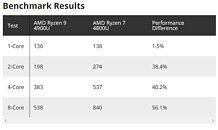
AMD Readying New Ryzen 9 "Renoir-U" Flagship to Beat Core i7-10710U
When it launched late March, the AMD Ryzen 9 4900H held the distinction of being the fastest notebook processor, the very first time AMD held the distinction, but only for a brief period before Intel launched its Core i9-10980HK to take back the performance lead. Over in the 15 W category, AMD's Ryzen 7 4800U is holding the fort on two fronts - against the "Comet Lake-U" and the "Ice Lake-U." According to reports, AMD wants to take another swing at this category with a new flagship Ryzen 9 series part.
Called the Ryzen 9 4900U, and unearthed from the User Benchmark database by TUM_APISAK, the new SKU is designed to compete with the Core i7-10710U and Core i7-1065G7, in the 15 W category. Lenovo had a notebook featuring this part listed earlier this year. It is configured with an 8-core/16-thread CPU clocked at 1.80 GHz nominal, with up to 4.30 GHz boost, which may seem like a minor speed bump, until you compare its User Benchmark scores with those of the 4800U. Apparently, the 4900U has some boost algorithm secret sauce that makes it a double-digit percentage faster than the 4800U in multi-threaded tests (possibly better spread of boost clocks across multiple cores). The iGPU appears unchanged, with 8 "Vega" compute units (512 stream processors), and up to 1750 MHz engine clocks.
Called the Ryzen 9 4900U, and unearthed from the User Benchmark database by TUM_APISAK, the new SKU is designed to compete with the Core i7-10710U and Core i7-1065G7, in the 15 W category. Lenovo had a notebook featuring this part listed earlier this year. It is configured with an 8-core/16-thread CPU clocked at 1.80 GHz nominal, with up to 4.30 GHz boost, which may seem like a minor speed bump, until you compare its User Benchmark scores with those of the 4800U. Apparently, the 4900U has some boost algorithm secret sauce that makes it a double-digit percentage faster than the 4800U in multi-threaded tests (possibly better spread of boost clocks across multiple cores). The iGPU appears unchanged, with 8 "Vega" compute units (512 stream processors), and up to 1750 MHz engine clocks.



